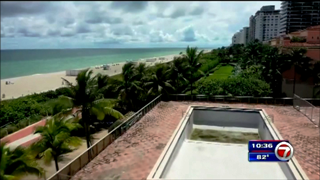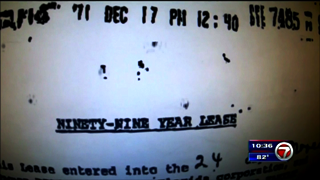Residents of a South
Florida condo building have a pool problem, and it could
take 50 years — yes, 50 years — to fix. Karen Hensel
explains in tonight’s 7 Investigates.
The pool at the Maison Grande Condominium on Miami Beach is
currently closed for repairs.
|
It may even have to be
replaced, but once the pool is fixed and filled, the money
being sunk into it will not stop because the pool problems
here go much deeper.
Alan DelForn, unit owner: “We’re looking at three
generations that are paying for this pool.”
Three generations, or 99 years to be exact.
Part of the monthly maintenance fees for the 502 condo
owners here goes to lease their own pool because it’s not
actually theirs to begin with and hasn’t been since the
building opened in 1971. |
|
|
Kim Alessi has lived here since 2011.
Kim Alessi, unit owner: “What he did was he sectioned off
and kept a portion of the property where the pool was going
to be built.”
|
In what’s called a
recreational lease, the building’s developer retained
ownership of the pool and a portion of the deck.
The condo owners are charged to use it, even when they can’t
swim in it.
Kim Alessi: “The pool has been closed since June of 2019,
and we still had to pay $75,000 a month for a closed pool
that no one can use.”
This July, the payment was $77,000, meaning the association
is on track to spend more than $920,000 just this year for
the pool! And if it ends up needing to be replaced, unit
owners will be responsible for the cost but still won’t own
it.
Kim Alessi: “It says that we’re responsible for all
maintenance, for all taxes. We have to insure it.” |
|
|
At this point, you may be wondering
how this is even legal? And it’s not anymore, but it was
when the lease was signed, and that has condo owners here
locked into a losing legal battle. They have lost in both
state and federal courts.
Alexander Turner, real estate attorney: “The Florida Supreme
Court said a contract is a contract, and even though it may
be very unfair, you know, everybody knew what they were
getting into when they got into it, or at least that’s the
presumption.”
Real estate attorney Alexander Turner says these kinds of
leases were common back in the early ’70s.
Alexander Turner: “The legislature actually banned these
things. They said no more leases after 1975 because some of
these leases were literally 99 years.”
Brenda Torres, condo unit owner: “I know there’s been
several generations of owners who have tried to address this
matter.”
Brenda Torres has owned a unit at Maison Grande for four
years and is a former board member.
She says the pool payments have a ripple effect.
Brenda Torres: “We have to forgo certain improvements in the
building, certain crucial improvements because first we have
this obligation.”
The unit owners are hoping by speaking out, state lawmakers
will step in to help.
Kim Alessi: “The condo regulation laws need to be changed to
reflect that this is not a proper law and void this lease
out. We’ve paid for 49 years.”
Alan DelForn: “And it still has another 50-plus years to go,
which means that they’re going to be collecting another
roughly $75 million, and anyone in their right mind would go
‘What are you, crazy? One hundred million dollars for a
pool?'”
We reached out to the developer and family trust that
collects the lease payments but have not heard back.
Meanwhile, unit owners see no end in sight.
Brenda Torres: “We have grandmothers, grandfathers. We have
single mothers, young families, and from every angle, I
mean, it just doesn’t seem fair.”
Fair or not, this swimming pool saga could continue until
the lease ends in the year 2070.

